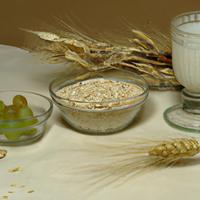
1 serving (150 grams) contains 120 calories, 3.0 grams of protein, 4.0 grams of fat, and 15.0 grams of carbohydrates.

Log this food in SnapCalorie

Nutrition Information
Calories |
189.3 | ||
|---|---|---|---|
% Daily Value* |
|||
| Total Fat | 6.3 g | 8% | |
| Saturated Fat | 0.8 g | 4% | |
| Polyunsaturated Fat | 0 g | ||
| Cholesterol | 0 mg | 0% | |
| Sodium | 78.9 mg | 3% | |
| Total Carbohydrates | 23.7 g | 8% | |
| Dietary Fiber | 3.2 g | 11% | |
| Sugars | 9.5 g | ||
| protein | 4.7 g | 9% | |
| Vitamin D | 0 mcg | 0% | |
| Calcium | 157.7 mg | 12% | |
| Iron | 1.6 mg | 8% | |
| Potassium | 236.6 mg | 5% | |
* Percent Daily Values are based on a 2,000 calorie diet. Your daily values may be higher or lower depending on your calorie needs.
Food Attributes
Source of Calories
About Oat yogurt
Oat yogurt is a creamy, dairy-free alternative made from fermented oats, often blended with water and live active cultures to achieve its signature tangy taste and smooth texture. Originating as part of the growing plant-based movement, it’s a sustainable option rooted in Nordic cuisine, where oats are a dietary staple. Rich in probiotics, oat yogurt can support gut health, and its high fiber content contributes to digestion and satiety. It typically contains vitamins like B12 and D, essential for energy and bone health, especially when fortified. Oat yogurt is naturally low in fat but can be higher in added sugars depending on the brand or flavoring, so it’s wise to choose unsweetened versions for maximum nutritional benefit. Free from lactose, it’s an excellent choice for those with dairy sensitivities or who follow vegan diets, delivering creamy satisfaction with a nourishing and eco-friendly edge.



